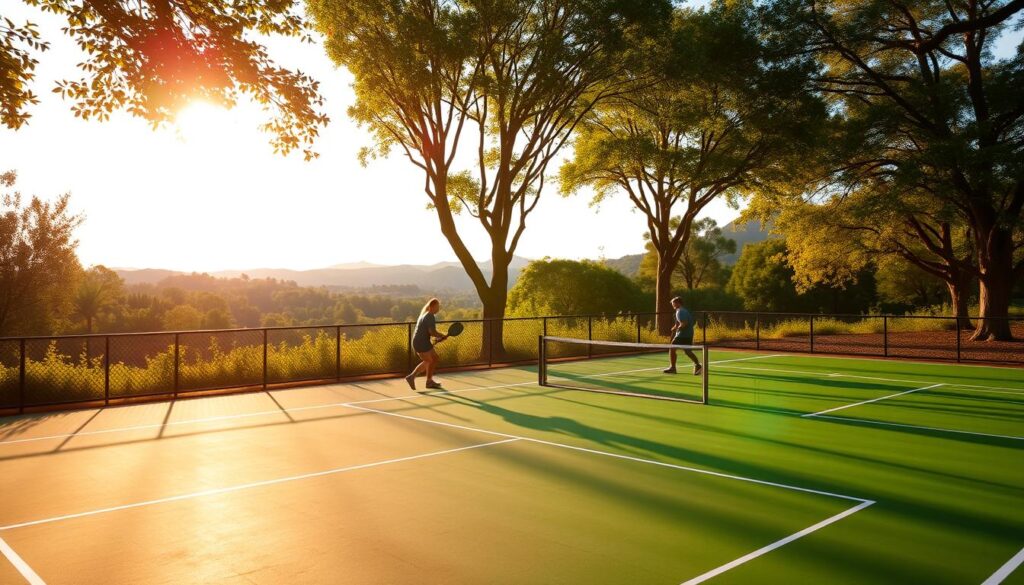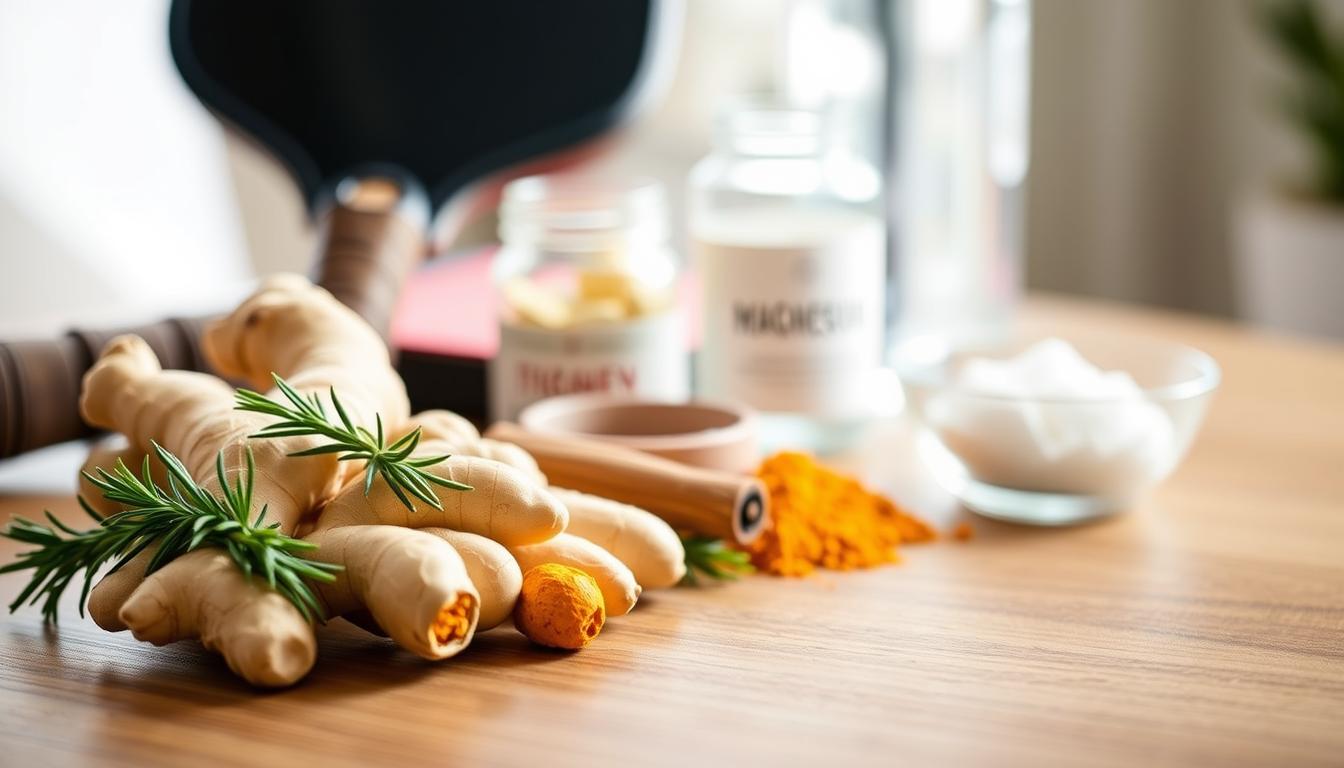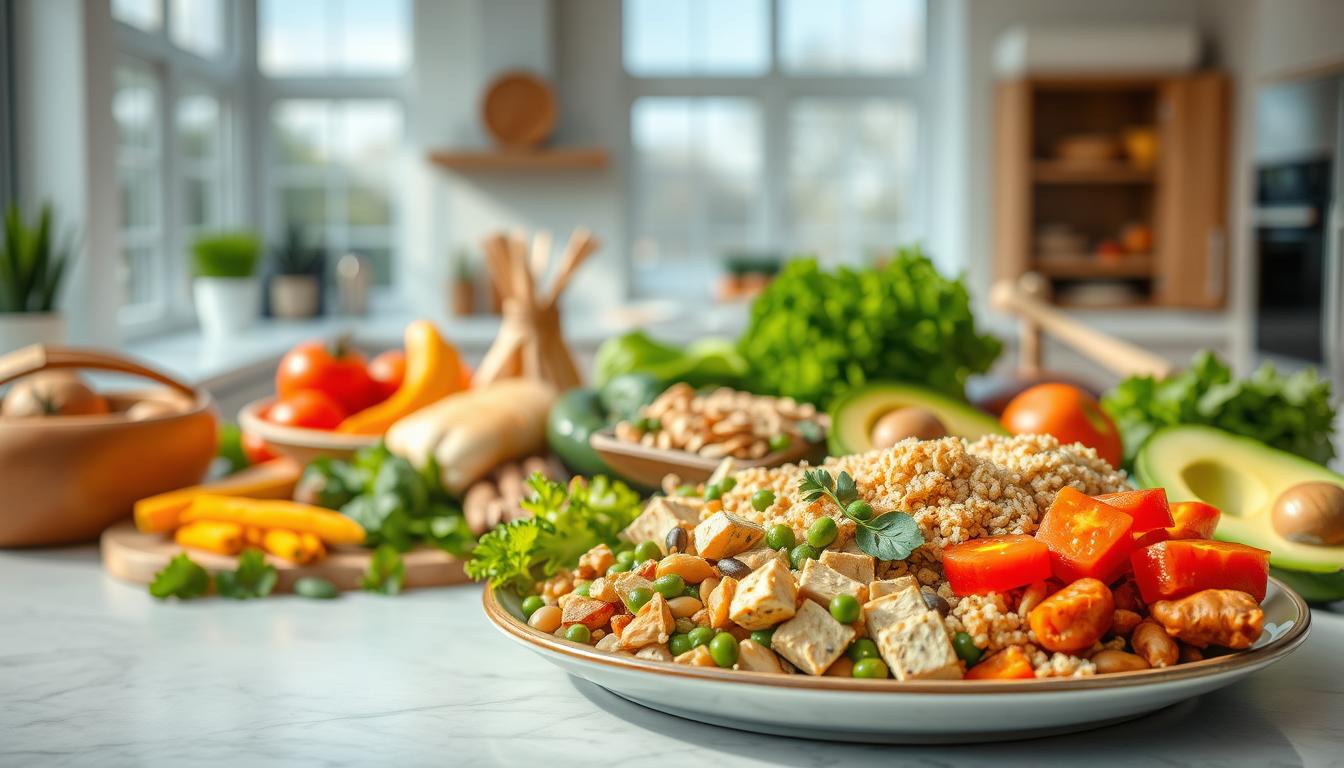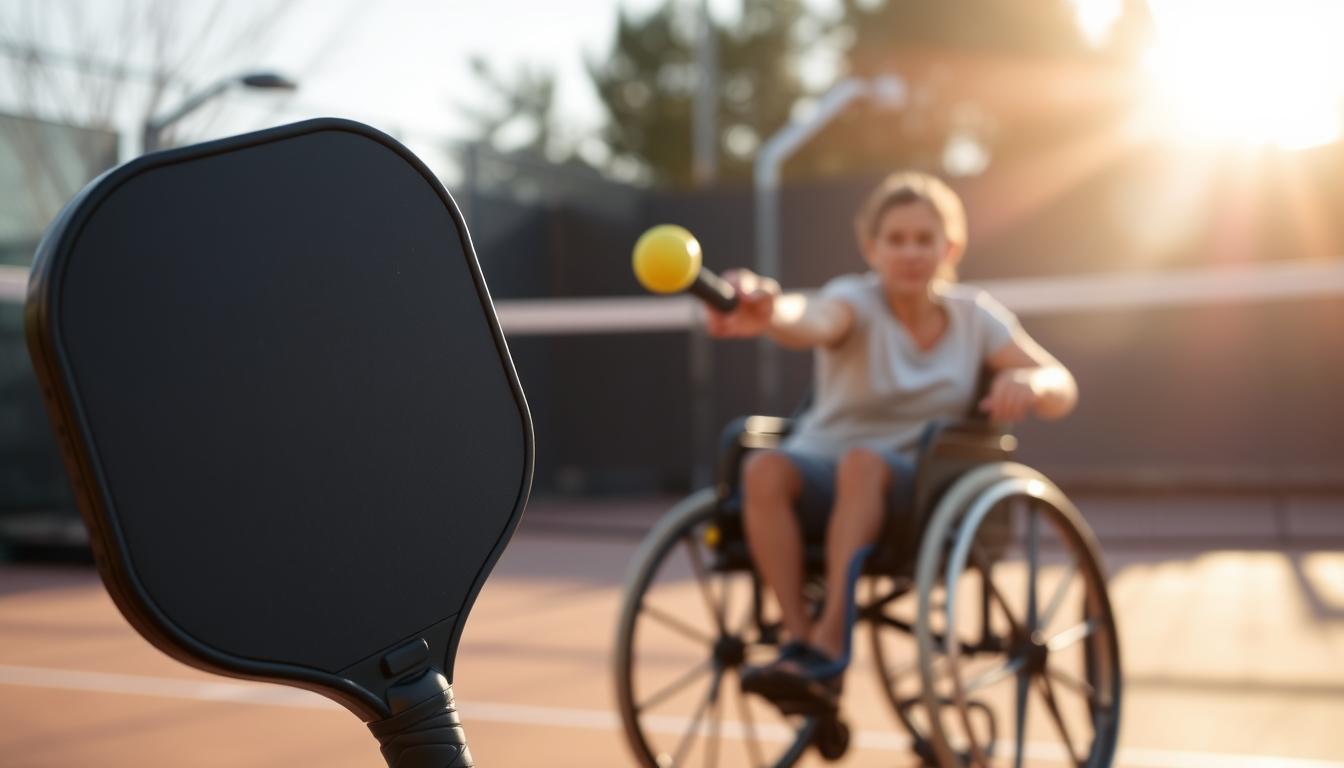Ever thought your diet could boost your pickleball game? For players over 50, a vegan diet might be the key. We’ll look at how to track your progress in pickleball with a vegan diet. You’ll learn how to set goals and measure your success, both on and off the court.
Introduction to Pickleball and Vegan Diets
Pickleball is becoming more popular, especially among seniors. It combines elements from badminton, tennis, and table tennis. This sport is low-impact but fun, helping players stay active and connect with others.
It’s great for all skill levels, making it perfect for seniors wanting to stay fit. A pickleball overview shows it’s a great way to improve health in your 50s and beyond.
Many seniors are also turning to vegan diets. This diet is good for the heart, helps with weight, and boosts energy. Eating whole foods, fruits, and veggies can make seniors perform better on the court and feel healthier overall.
Learning about pickleball and vegan diets can help athletes improve their game. It shows how a healthy diet can support a fun and active lifestyle.

The Importance of Self-Assessment in Your 50s
Self-assessment is key for people over 50, especially for aging athletes. It helps them find out what they’re good at and what they need to work on. This leads to better training and health plans.
Regular health checks are important for ongoing growth. Knowing their physical limits helps them create fitness plans that fit their needs.
A good self-assessment looks at diet, exercise, and recovery. This knowledge lets aging athletes improve where needed. It keeps them energized and motivated.
Self-assessment also makes them accountable and proactive about their health. It’s a way to stay on track with fitness goals.

In the end, self-assessment guides aging athletes through their fitness journey. It’s crucial for long-term health and reaching fitness and wellness goals.
Understanding the Benefits of a Vegan Diet
A vegan diet has many benefits, especially for those who want to stay healthy as they age. Switching to a plant-based diet can make you more aware of nutrition for seniors. It also gives you important nutrients for your body and mind.
Improved Cognitive Function
Going vegan can boost your brain health. Studies show that eating plant-based foods can lower the chance of brain problems. Foods like nuts, seeds, and leafy greens are great for your brain. They are key for people over 50.
Reduced Health Risks
A vegan diet is great for preventing diseases. People who eat plants often have fewer heart and diabetes problems. This diet can help you stay healthy and active as you get older.
Navigating the Challenges of a Vegan Diet
Starting a vegan diet can be tough, especially for beginners. Knowing the common hurdles helps in finding ways to overcome them.
Common Roadblocks for New Adopters
Switching to veganism brings plant-based diet challenges that affect eating habits and performance. Many face doubts about what to eat, leading to confusion. It’s key to eat a variety of foods to get enough nutrients for athletes.
At social events, new vegans often find it hard to find food that fits their diet. This can make social gatherings less fun and make them feel left out. Also, making meals that are both healthy and tasty takes effort and knowledge. Finding enough protein in a vegan diet can also be a challenge for newbies.
| Obstacle | Description | Impact on Dietary Adherence |
|---|---|---|
| Lack of Knowledge | Unfamiliarity with vegan ingredients and cooking methods | May lead to unbalanced meals and low adherence |
| Social Situations | Difficulty finding vegan options when dining out or in groups | Can create feelings of frustration and isolation |
| Protein Intake | Unsure of how to meet protein needs through plant-based sources | Risk of inadequate nutrition affecting performance |
| Meal Planning | Time-consuming process to develop diverse, balanced meals | May discourage continued commitment to the diet |
Vegan Self-Assessment for Players Over 50
For senior athletes, a vegan self-assessment is key. It helps them check their diet and how it affects their performance. By tracking what they eat, players can make better choices for their health and fitness.
Tracking Nutritional Intake
Keeping track of what you eat is important. It shows if you’re getting enough energy, especially on a vegan diet. Apps can help count calories and analyze nutrition, guiding players to better meals.
Identifying Areas for Improvement
Checking progress regularly is crucial. Senior athletes might find they need more protein or varied meals. This shows the need for different foods and more nutrients to boost performance.
| Food Group | Common Vegan Sources | Protein Content per Serving |
|---|---|---|
| Legumes | Lentils, Chickpeas, Black Beans | 18g |
| Nuts and Seeds | Almonds, Chia Seeds, Hemp Seeds | 6-8g |
| Whole Grains | Quinoa, Brown Rice, Oats | 5-7g |
| Vegetables | Broccoli, Spinach, Peas | 3-4g |
| Plant-Based Protein | Tofu, Tempeh, Seitan | 15-25g |
Being strict with vegan self-assessment can greatly help senior athletes. It links diet closely to physical performance.
Setting Goals for Pickleball and Diet
Setting clear goals is key to bettering your pickleball game and diet. Good goal-setting keeps you motivated and focused. Here are some tips for setting effective goals:
- Be Specific: Know exactly what you want to achieve in your game and diet. For example, aim to improve your serve or eat more fruits and veggies.
- Make Goals Measurable: Keep track of your progress. This could mean watching your match stats or a food diary to hit your diet goals.
- Ensure Goals are Achievable: Your goals should match your current abilities and lifestyle. Don’t set goals that are too high or you’ll get discouraged.
- Set Relevant Goals: Make sure your goals fit your interests and health needs. Think about how eating better can help your pickleball and overall health.
- Time-bound Goals: Give yourself a deadline to reach your goals. This adds a sense of urgency and commitment.
As you move forward, regularly check how you’re doing in both areas. Change your goals if they’re not helping you grow anymore. With regular goal-setting, you’ll make big strides in your pickleball and diet.
Measuring Progress in Pickleball Performance
Improving in pickleball takes a few steps. Players can track their fitness to see how they move and their heart rate. This info helps them know their strengths and what to work on.
Using Fitness Trackers for Insight
Fitness trackers are now a big deal for athletes. They track important stuff like:
- Heart rate to check fitness.
- Steps to see how active you are.
- Shots to see if you’re consistent.
These details give a full picture of your fitness and how it affects your game. You can spot patterns and tweak your training to get better.
Assessing Skill Development
Checking your skills is key to getting better at pickleball. You can look at different parts of your game, like:
- Shot accuracy to do well in games.
- Strategic play to make smart choices.
- Footwork and position to stay ahead.
By regularly checking your skills, you can see how you’re doing. This helps you set goals and improve your game in a focused way.
Creating a Balanced Meal Plan
Effective meal planning is key for a balanced diet, especially for vegan athletes. Plant-based foods offer the protein, vitamins, and minerals needed for an active lifestyle. This method meets both macro and micronutrient needs and boosts overall health.
A good meal plan makes it easier to shop for groceries and prep meals. It includes whole grains, legumes, nuts, seeds, and veggies. This diet is great for sports like pickleball.
Here’s a table showing different food groups and how much to eat:
| Food Group | Examples | Recommended Servings |
|---|---|---|
| Grains | Quinoa, Brown Rice, Barley | 3-4 servings per day |
| Legumes | Lentils, Chickpeas, Black Beans | 1-2 servings per day |
| Nuts & Seeds | Almonds, Chia Seeds, Flaxseeds | 1 serving daily |
| Vegetables | Spinach, Kale, Carrots | 3-5 servings per day |
| Fruits | Berries, Apples, Bananas | 2-3 servings per day |
Vegan athletes can try new recipes and still get all the nutrients they need. Balancing these elements is vital for success and better performance in sports.
The Role of Meal Planning in Progress Evaluation
Meal planning is key for athletes over 50 who play pickleball and follow a vegan diet. It helps manage nutrients and supports training goals. A good meal plan ensures you get the right nutrients for health and performance.
Managing Protein and Nutrient Intake
Protein is vital for muscle repair and recovery. A vegan meal prep should include various protein sources. This boosts energy and improves pickleball performance.
Using foods like lentils, chickpeas, quinoa, and tofu helps meet protein needs. This supports your health and sports performance.
By planning meals with different protein sources, you manage nutrients better. Athletes can track their intake to balance macros and micros. This is tailored to their health and sports needs.
| Food Source | Protein Content (per 100g) | Key Nutrients |
|---|---|---|
| Lentils | 9g | Iron, Folate |
| Chickpeas | 8g | Manganese, Phosphorus |
| Quinoa | 4g | Magnesium, Antioxidants |
| Tofu | 8g | Calcium, Iron |
Adding a variety of protein sources to your meals boosts athletic performance. It also ensures you manage nutrients well. A thoughtful meal plan helps track progress and reach health goals.
Incorporating Physical Activity Wisely
Finding the right way to do physical activity is key for those playing pickleball, especially over 50. It’s important to balance play with rest to improve performance and avoid injuries. Knowing your body’s limits and using good recovery strategies is essential.
Finding the Right Balance of Play and Rest
Creating a routine that includes pickleball and rest is vital. Too much activity can lead to burnout and reduce fun. Here are some tips to find a good balance:
- Plan a weekly schedule for pickleball, other exercises, and rest days.
- Do low-impact exercises on rest days to stay active and flexible.
- Watch your energy levels and adjust your activities to keep playing long-term.
Our Favorite Plant-Based Foods for Athletes
For athletes, choosing the right plant-based foods is key. They help boost energy and aid in recovery. Here are some top picks:
- Quinoa: It’s a complete protein, offering all nine essential amino acids for muscle repair and growth.
- Lentils: They’re full of protein and fiber, giving long-lasting energy and iron for endurance.
- Chickpeas: Rich in protein, chickpeas are great for vegan snacks or salads.
- Nuts and seeds: These are full of healthy fats, proteins, and vitamins, perfect for snacking.
- Leafy greens: Spinach and kale are packed with vitamins and antioxidants, boosting health and recovery.
These superfoods are not just good for nutrition; they can also improve your game. Adding them to your diet keeps you energized during tough play. They also provide the nutrients you need to excel in sports.
Importance of Hydration in the Vegan Lifestyle
For vegan athletes, staying hydrated is key for top performance and energy. Hydration affects not just how well you perform but also how fast you recover. Using good hydration tips can really boost your health and sports skills.
Experts say to drink about half your body weight in water each day. This can change based on how active you are and where you live. For instance, those playing intense pickleball might need more water to replace lost fluids.
Being careful with how much water you drink during workouts and games is important. It helps keep your energy up. Staying hydrated also helps your body absorb nutrients better, which is good for a vegan diet.
| Hydration Tips | Recommended Daily Intake (Ounces) | Effect on Performance |
|---|---|---|
| Drink water before, during, and after exercise | Varies per individual | Supports endurance and reduces fatigue |
| Monitor urine color as a hydration gauge | N/A | Indicates hydration level |
| Incorporate hydrating fruits and vegetables | N/A | Provides additional nutrients and hydration |
| Set reminders to drink water throughout the day | N/A | Ensures consistent fluid intake |
Listening to Your Body: Signals of Progress
Body awareness is key to noticing health signals that show your progress in pickleball and a vegan diet. It helps athletes understand their energy, stamina, and recovery times. These signs are important for tracking progress and making changes to training and diet.
For athletes over 50, paying attention to how your body reacts to food and exercise is crucial. Seeing improvements like better endurance or less fatigue after games means your diet is working. But feeling tired or taking a long time to recover might mean you need to adjust your nutrition and rest.
By listening to your body, you can appreciate the connection between diet, training, and health more. This focus on body awareness makes your athletic journey more fulfilling and enjoyable.
Conclusion
Checking your progress is key, especially for pickleball players over 50. A vegan diet can boost your health and game skills. Regular checks help spot what’s working and what’s not in your nutrition.
Making smart food choices and self-checks helps set goals. This can improve your skills and health, both on and off the court. Knowing how food affects your game and health helps keep you active and strong as you get older.
Reflecting on your progress helps maintain a healthy vegan lifestyle. It lets players enjoy the perks of their diet while excelling in pickleball. By regularly reviewing their path, players can keep their diet and fitness in sync for the long haul.




